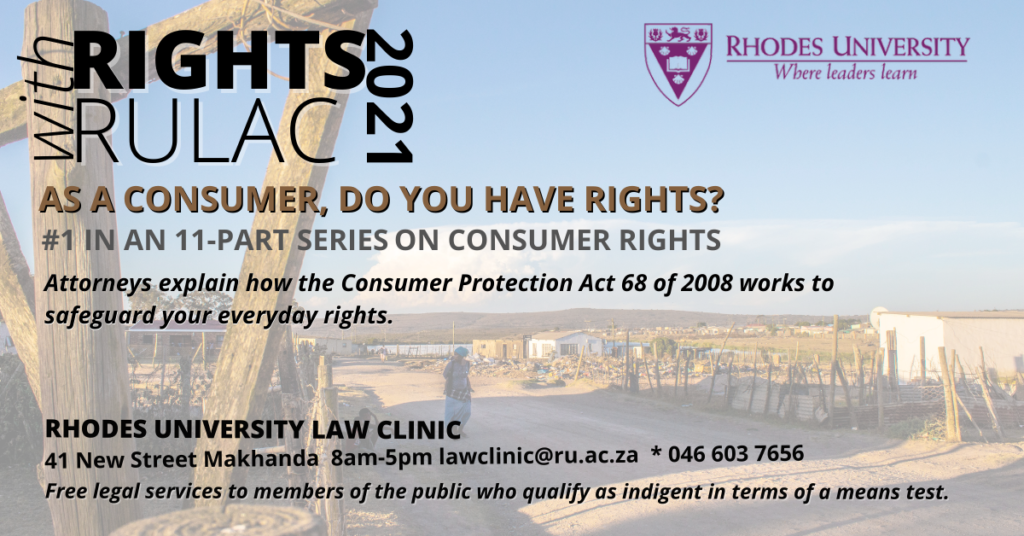By INGA ZENZILE
Most of us would easily answer ‘yes’ to this question, but do you know what this means for you as an ordinary South African citizen?
In this article we will explore the legislation that gives you rights as a consumer, the purpose of this legislation, its main objectives, and lastly how it is applied, as this legislation can play an important role in our daily lives. This article is the first in a series of articles on the topic that will be published monthly during 2021.
The legislation that we speak of is the Consumer Protection Act 68 of 2008. It plays such an important role because almost daily we all purchase items or use services, and so we are all consumers. A consumer in terms of the Consumer Protection Act (the CPA) is defined as a person to whom goods or services are promoted or supplied, or who has entered into a transaction with a supplier in the ordinary course of the supplier’s business.
What is the purpose of the CPA?
The CPA provides a legal framework for the protection of the interests of all consumers. It protects consumers of goods and services and the public against unfair practices in the marketplace. It was designed to ensure accessible, transparent, efficient redress for consumers who are subjected to abuse or unethical exploitation in the marketplace or by service providers.
Prior to the CPA some suppliers blatantly deceived consumers about the quality of their goods and services, or offered goods or services on unreasonable terms and conditions, leaving the consumer with no remedy if there was a problem with these goods or services.
For example, since the beginning of lockdown some retailers excessively increased the prices of some products, for example garlic and ginger to mention a few. In these circumstances the CPA plays an important role because it provides a mechanism for consumers to lay out their grievances about the price increment. In this way, retailers can be held accountable for excessive price increases of products, which can prevent consumer exploitation.
What are the main objectives of the CPA?
- The promotion and protection of the economic interests of the consumer.
- To improve access to information that is necessary for consumers to make informed decisions according to their needs and desires.
- To protect consumers from hazards to their well-being and safety.
- To establish a consumer market that is fair and accessible.
- To create a consistent, accessible and efficient system to resolve consumer disputes.
- To protect and grant rights to consumers who were previously disadvantaged, and to ensure they are protected from fraudulent and misleading behavior – most especially people who are the most susceptible and vulnerable in society, for example those who are uneducated, elderly, poor, or very young.
When does the CPA apply?
The CPA applies to: every transaction within the Republic of South Africa between suppliers and consumers; to the promotion or the supply of goods and services to the goods and services themselves; and lastly, to the goods which are the subject of exempted transactions.
The CPA does not apply to: the promotion and supply of goods or services to the State; transactions that constitute credit agreements under the National Credit Act (although the goods or services which are the subject of a credit agreement are not excluded from the protection of the CPA); employment contracts and collective bargaining agreements; where the Minister of Trade and Industry has granted exemption to transactions; where the consumer is a company or organisation with a turnover of R 2 000 000 or more every year.
So then, as a consumer, do you have rights?
Hopefully you answered ‘yes’ to the title of this article, because if you know your rights you will be empowered to act whenever you believe that a supplier is treating you unfairly.
Some of the rights protected by the CPA are the rights: to privacy; to choose your product; to fair and honest dealing; to disclosure of information; to fair value; to good quality and safety of products purchased; and more. These will be dealt with in our monthly articles this year. Next month we will canvass the right to equality and the right to privacy.
- Inga Zenzile is an attorney at the Rhodes University Law Clinic. This article is the first of a 2021 series on consumer rights in terms of the Consumer Protection Act 68 of 2008.
Rhodes University Law Clinic helping you
The Rhodes University Law Clinic strives to improve access to justice through the provision of free legal services to indigent people in most areas of law. The Law Clinic’s New Street offices are open during ordinary business hours, and their services are available to those members of the public who qualify for assistance in terms of a means test. For more detail, please contact:
Rhodes University Law Clinic
41 New Street, Grahamstown
Telephone 046 603 7656
lawclinic@ru.ac.za
https://www.grocotts.co.za/2021/03/08/the-right-to-equality-and-the-right-to-privacy/
https://www.grocotts.co.za/2021/02/09/right-on/
Know your rights as a consumer
This 11-part 2021 series is written by attorneys at the Rhodes Law Clinic. The articles cover various aspects of consumer rights in terms of the Consumer Protection Act 68 of 2008. Here are the articles published to date:
#1 As a consumer, do you have rights?
#2 The right to equality and the right to privacy



